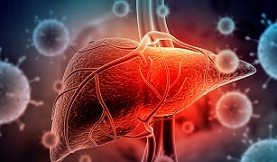Coronavirus News: German Study Confirms That SARS-CoV-2 Coronavirus Can Invade And Damage The Liver
Source: Coronavirus News Feb 05, 2021 4 years, 11 months, 3 weeks, 4 days, 12 hours, 22 minutes ago
Coronavirus News: A new study by researchers from University of Bielefeld-Germany, the University Medical Center Hamburg-Eppendorf-Germany and also Harvard Medical School-USA has confirmed that the SARS-CoV-2 coronavirus can invade and damage the liver.

The study findings were published in the peer reviewed journal: Clinical Gastroenterology and Hepatology.
https://www.ncbi.nlm.nih.gov/pmc/articles/PMC7844358/
SARS-CoV-2 is known to infect the nasopharynx and lungs and causes COVID-19. It may impact the heart, brain, kidney and liver.
https://www.nejm.org/doi/full/10.1056/NEJMc2011400
Although functional impairment of the liver has been correlated with worse clinical outcomes, little is known about the pathophysiology of hepatic injury and repair in COVID-19. Histological evaluation has been limited to small numbers of COVID-19 cases with no controls and demonstrated largely heterogeneous patterns of pathology.
https://www.nature.com/articles/s41379-020-00649-x
https://pubmed.ncbi.nlm.nih.gov/33332624/
https://www.thelancet.com/pdfs/journals/eclinm/PIIS2589-5370%2820%2930178-4.pdf
Liver tissues of 60 patients who died of COVID-19 pneumonia were obtained from complete autopsies performed in Hamburg between March and June 2020. A cohort of 13 patients with fatal pneumonia in the absence of SARS-CoV-2 infection served as controls. Hematoxylin and eosin staining and immunohistochemistry were applied to comprehensively evaluate the pathophysiology and regeneration aspects at the level of the hepatic microarchitecture. Label-free coherent-Raman-scattering- and second-harmonic-generation-imaging visualized major morphological changes, revealing steatosis and dilatation of sinusoid.
The study found that there were no significant differences in the patient characteristics except for pre-existing neurological conditions (p=0.04). Only 5 patients with COVID-19 and 1 control had history of liver disease. A minority of patients in the COVID-19-group (17%) received intensive care at the time of death with a trend within that group towards home or nursing home care, when compared with controls.
qRT-PCR and in situ hybridization revealed viral RNA and replicative intermediates in liver tissues. Viral nucleocapsid-protein was detected in hepatic stem/progenitor cells (HSPC), cholangiocytes and hepatocytes. SARS-CoV-2 was detected at the RNA- and/or protein level in 25% of livers in COVID-19 patients (table S1). qRT-PCR demonstrated two out of five bile samples positive for SARS-CoV-2.
Sinusoidal platelet-aggregates were predominantly observed in the hepatic microvasculature of COVID-19 patients when compared to controls (70% vs. 30%; p=0.032). Likewise, sinusoidal (p=0.024) and portal dilatation were observed (p=0,002). Hepatic microvascular thrombosis in COVID-19 patients was predominantly observed in non-hospitalized patients (32%; not receiving anti-coagulan
t therapy), when compared to general in-patients (3%) and those requiring intensive care (10%) (p=0.016)
COVID-19 patients demonstrated more hepatic steatosis (p=0.046), mainly the microvesicular variant (p=0.01), when compared to SARS-CoV-2-negative controls. Severe intrahepatic injury was associated with the activation of the intrahepatic stem cell niche along the canal of Hering, resulting in regenerative clusters of EpCAM+HSPC, hepatobiliary intermediate cells and premature hepatocytes. Increased numbers of EpCAM+HSPC were observed alone, and in regenerative clusters, in patients with COVID-19, when compared to control livers (>25 HSPC/10 field views: 66% vs 22%; p=0.020).
Lead researcher Dr Jan Schulte am Esch from the University Hospital of Bielefeld told Thailand Medical News, "The study demonstrates once again that COVID-19 is a systemic disease and that SARS-CoV-2 damages the liver and results in vascular injury."
The study team analyzed liver tissue obtained at autopsy from 60 patients who died of COVID-19 pneumonia in Hamburg between March and June, as well as a control of 13 patients who died of pneumonia but did not have SARS-CoV-2 infection.
Importantly only five patients with COVID-19 and one control had a history of liver disease, the team reports in Clinical Gastroenterology and Hepatology.
Dr Shulte am Esch added, "We show in this paper the essential elements of the liver pathology that result in the abnormal hepatic function, seen in severe forms of COVID-19. The changes manifest as thromboses of hepatic micro-vessels and sinusoids with aberrant hepatic regeneration responses, as has already been observed for other forms of viral hepatitis.”
He further added, "Interestingly, micro-thrombosis was significantly more common in those patients who died in nursing homes or in a home setting - in a care area where routine anticoagulation would be unusual. The benefits of therapeutic or other levels of anticoagulation in COVID-19 are an ongoing source of controversy, given the high rates of bleeding complications with current approaches. However, our study may indicate a somewhat protective effect of systemic anticoagulation on the liver vasculature in severe disease and further studies are awaited with interest>"
The study findings also support another case study recently conducted by researchers from the Division of Hepatology, Donald and Barbara Zucker School of Medicine at Hofstra/Northwell, Manhasset-New York that published recently in the American Journal of Gastroenterology describing three young adults who developed prolonged and severe liver disease during recovery from COVID-19.
https://journals.lww.com/ajg/pages/articleviewer.aspx?year=9000&issue=00000&article=98947&type=Abstract
Thailand Medical News had already been warning about liver issues as a result of SARS-CoV-2 coronavirus as early as March 2020.
https://www.thailandmedical.news/news/breaking-covid-19-research-studies-warn-of-high-prevalence-of-liver-injury-in-covid-19-patients
https://www.thailandmedical.news/news/covid-19-research-university-of-bristol-researchers-warn-that-liver-complications-are-common-in-covid-19-patients
https://www.thailandmedical.news/news/breaking-more-emerging-chinese-research-studies-shows-that-the-sars-cov-2-coronavirus-also-attacks-the-kidneys,-pancreas-and-liver
For the latest
Coronavirus News, keep on logging to Thailand Medical News.
